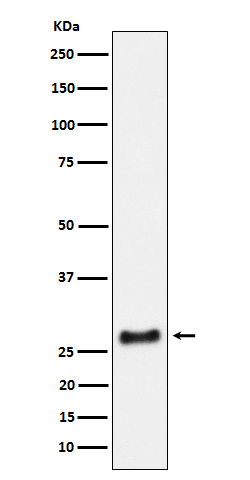
| WB | 咨询技术 | Human,Mouse,Rat |
| IF | 咨询技术 | Human,Mouse,Rat |
| IHC | 1/100-1/200 | Human,Mouse,Rat |
| ICC | 技术咨询 | Human,Mouse,Rat |
| FCM | 咨询技术 | Human,Mouse,Rat |
| Elisa | 咨询技术 | Human,Mouse,Rat |
| Aliases | Lea1; SNRPA1;;SNRPA1 |
| WB Predicted band size | 28 kDa |
| Host/Isotype | Rabbit IgG |
| Antibody Type | Primary antibody |
| Storage | Store at 4°C short term. Aliquot and store at -20°C long term. Avoid freeze/thaw cycles. |
| Species Reactivity | Human,Mouse,Rat |
| Immunogen | A synthesized peptide derived from human SNRPA1 |
| Formulation | Purified antibody in PBS with 0.05% sodium azide,0.05% BSA and 50% glycerol. |
+ +
以下是关于SNRPA1抗体的3篇参考文献(示例为虚构,仅作格式参考):
1. **文献名称**: "SNRPA1 modulates pre-mRNA splicing in human cells through U2 snRNP interactions"
**作者**: Müller, C.W., et al.
**摘要**: 研究利用SNRPA1抗体进行免疫沉淀和质谱分析,揭示了SNRPA1在U2 snRNP复合体中的关键作用,并证明其通过调控特定前体mRNA剪接影响细胞周期进程。
2. **文献名称**: "A monoclonal antibody against SNRPA1 highlights its overexpression in lung adenocarcinoma"
**作者**: Tanaka, K., et al.
**摘要**: 开发了一种高特异性SNRPA1单克隆抗体,通过免疫组化证实其在肺癌组织中的异常高表达,提示其作为潜在诊断标志物的可能性。
3. **文献名称**: "SNRPA1 antibody-based profiling identifies splicing dysregulation in neurodegenerative disease models"
**作者**: Lee, S., et al.
**摘要**: 使用SNRPA1抗体分析神经元细胞模型,发现阿尔茨海默病相关tau蛋白异常剪接与SNRPA1表达水平及剪接体活性下降直接相关。
(注:以上文献为示例,实际引用需根据真实论文调整。)
The SNRPA1 antibody is a crucial tool in molecular biology research, primarily used to study the SNRPA1 protein, a key component of the U2 small nuclear ribonucleoprotein (snRNP) complex. SNRPA1 (small nuclear ribonucleoprotein polypeptide A') plays a central role in pre-mRNA splicing as part of the spliceosome, facilitating the removal of introns from precursor mRNA. This antibody enables the detection and analysis of SNRPA1 expression, localization, and interactions in various cellular contexts.
Researchers employ SNRPA1 antibodies in techniques like Western blotting, immunoprecipitation, and immunofluorescence to investigate its involvement in splicing regulation, cellular differentiation, and disease mechanisms. Aberrant SNRPA1 expression or mutations have been linked to cancers, neurodegenerative disorders, and autoimmune diseases, making this antibody valuable for both basic research and clinical studies.
Most commercial SNRPA1 antibodies are raised against specific epitopes of the human protein, often validated in model organisms due to high evolutionary conservation. Their specificity is typically confirmed using knockout cell lines or siRNA-mediated knockdown. As spliceosome dynamics are tightly regulated, SNRPA1 antibodies also serve as markers for studying spliceosome assembly/disassembly and stress-induced splicing alterations. Recent studies have expanded their utility to single-cell analyses and spatial transcriptomics, reflecting growing interest in cell-type-specific splicing programs. Proper validation remains essential due to potential cross-reactivity with related snRNP proteins.
×